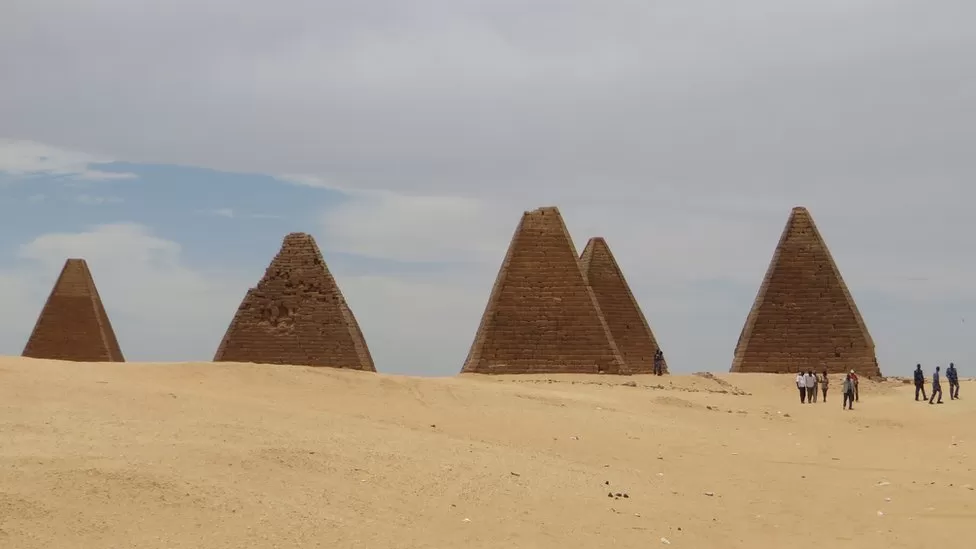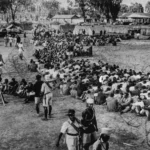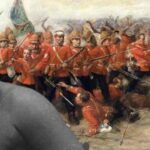Afrika ina historia tajiri na ngumu, lakini kuna ujinga ulioenea juu ya urithi huu. Mwanahistoria mashuhuri wa Uingereza aliwahi kusema kwamba kulikuwa na historia ya Wazungu tu barani Afrika. Katika siku za hivi karibuni, kumekuwa na kuongezeka kwa shauku ya nini kiko nyuma ya ukosefu huu wa maarifa.

Piramidi Kuu ya Giza huko Cairo inachukuliwa kuwa moja ya maajabu saba ya ulimwengu wa kale. Lakini safiri zaidi kusini kando ya Mto Nile na utapata piramidi elfu moja zilizokuwa za Ufalme wa Kush, katika eneo ambalo sasa ni Sudan.
Kush ilikuwa nguvu kubwa ya Kiafrika na ushawishi wake ulienea hadi eneo ambalo sasa linajulikana kama Mashariki ya Kati.
Ufalme huo ulidumu kwa mamia mengi ya miaka, na katika karne ya nane KK ulishinda Misri na kutawala kwa sehemu bora zaidi ya karne.
Kilichosalia cha ufalme ni cha kuvutia vile vile. Zaidi ya 300 kati ya piramidi hizi bado hazijaguswa, karibu hazijaguswa tangu zilipojengwa karibu miaka 3,000 iliyopita.
Baadhi ya mifano bora zaidi inaweza kupatikana katika Jebel Barkal kaskazini mwa Sudan, iliyotangazwa kuwa Tovuti ya Urithi wa Dunia na shirika la Umoja wa Mataifa la utamaduni, UNESCO.
Hapa unaweza kupata piramidi, makaburi, mahekalu na vyumba vya kuzikia vilivyo na picha na maandishi yaliyopakwa rangi ambayo UNESCO inayaelezea kuwa kazi bora zaidi "za fikra za ubunifu zinazoonyesha maadili ya kisanii, kijamii, kisiasa na kidini ya kikundi cha wanadamu kwa zaidi ya miaka 2000"
Mradi huu ulianzishwa mwanzoni mwa miaka ya 1960 wakati wa uondoaji wa haraka wa ukoloni barani Afrika. Baadhi ya viongozi wapya wa Kiafrika waliojitegemea waliamua kwamba, baada ya kuziondoa nchi zao ukoloni, walitaka pia kuondoa ukoloni wao.
Wanahistoria wa Kimagharibi walikuwa wamelalamikia ukosefu wa hati zilizoandikwa katika baadhi ya nchi za Kiafrika na wametumia hii kama sababu ya kuhalalisha upuuzaji huo.
UNESCO iliwasaidia wasomi wa Kiafrika kuweka pamoja mradi huo, kuajiri wataalam 350, wengi wao kutoka Afrika na kutoka taaluma mbalimbali, kukusanya juzuu nane, kutoka kwa historia na kuendelea hadi zama za kisasa.
Buku la nane lilikamilishwa mwaka wa 1990 na kazi sasa inaendelea tarehe tisa.
UNESCO ilichukua hatua yenye utata ya kuanzisha juzuu na asili ya wanadamu na kuelezea nadharia ya mageuzi. Kwa kufanya hivyo, walijihatarisha kupata ghadhabu ya jumuiya za Wakristo na Waislamu katika baadhi ya nchi za Kiafrika ambako kulikuwa na imani iliyoenea sana ya uumbaji.
Mwanahistoria wa Kenya Richard Leakey, ambaye alichangia jarida la kwanza, anasema bado anaamini kuwa ukweli kwamba wanadamu walitokea Afrika ni laana kwa baadhi ya watu wa Magharibi, ambao wanapendelea kukataa asili yao ya Kiafrika.
Historia ya Ufalme wa Kush, nguvu kuu katika Asia ya Magharibi na Afrika, ambapo malkia wangeweza kutawala peke yao, pia mara nyingi hupuuzwa.
Hii inatumika pia kwa Ufalme wa Aksum, unaoelezewa kama moja ya ustaarabu mkubwa zaidi katika ulimwengu wa kale.
Wafalme wa Aksumite walidhibiti biashara katika Bahari Nyekundu kutoka kwenye kituo chao ambacho leo ni Eritrea na Ethiopia. Pia walikuwa watawala wa kwanza barani Afrika kuukubali Ukristo na kuufanya kuwa dini rasmi ya ufalme huo.
Historia hii haijulikani sana, barani Afrika na kwingineko, kwa sababu wasomi na walimu wengi katika nchi za Kiafrika wenyewe wamekuwa zao la elimu ya kikoloni, na kwa hivyo hawakuweza kupata maelezo ya kina na ya mpangilio wa historia yao wenyewe.
Mtazamo kama huo uliakisiwa katika fafanuzi za Hugh Trevor-Roper, anayezingatiwa sana kama mmoja wa wanahistoria wakuu wa Uingereza.
Alisema mwaka wa 1965: "Pengine, katika siku zijazo, kutakuwa na baadhi ya historia ya Afrika ya kufundisha. Lakini kwa sasa hakuna, au kidogo sana: kuna historia ya Wazungu tu katika Afrika.
"Mengine mengi ni giza, kama vile historia ya Amerika ya kabla ya Uropa, kabla ya Columbia. Na giza sio mada ya historia."
Ukweli kwamba watu wachache sana wanajua kuhusu juzuu ambazo zimekusanywa chini ya mwamvuli wa UNESCO pia inasema kitu. Unashangaa kwa nini viongozi hawakutaka kutoa mwanga zaidi juu yake.
Sipendekezi kuwa kulikuwa na njama, kwa kweli. Hayo tu hayakuwekwa mkazo wa kutosha kwenye historia ya Afrika na viongozi wa Afrika au wasio Waafrika.
Hata hivyo, hili ni la manufaa hasa kwa Afrika kwa sababu limefanywa watoto wachanga kwa kiwango ambacho hatujaona katika ukanda mwingine wowote wa dunia.
Changamoto ya ubaguzi
Hii ni kwa sababu kumekuwa na njia ya kuona Afrika katika umaskini na migogoro - mapinduzi, vita, njaa, rushwa - ambayo imekuwa aina ya mkato kwa bara ambalo bado lipo leo.
Masuala ya maendeleo barani Afrika bado yanasisitiza kwa kiasi kikubwa masuala ya hisani na misaada.
Ingawa haya yanafanywa kwa nia njema zaidi duniani, hata hivyo imejiingiza katika uwakilishi huu wa Afrika, ambapo inadhaniwa kuwa ili watu wajiendeleze na wapate chakula cha kutosha, ni lazima wategemee watu wa nje.
Historia ya Jumla ya Afrika ni mwanzo, na Unesco inapanga kujumuisha utafiti wake katika mitaala ya shule katika bara zima.
Tunatumahi, vizazi vijavyo vitakuwa na wazo bora la historia yao na kuona kwamba kuna mengi wanaweza kujivunia kutoka kwa maisha yao ya zamani. Zamani ambayo hutoa msingi wa siku zijazo kubwa zaidi.
Machapisho yanayohusiana
-
Luka wa Kahangara: Chifu Katika Moyo wa Mauaji ya Lari
Katika nyanda za juu zenye ukungu za Kati mwa Kenya, miaka ya mapema ya 1950 ilikuwa miaka ya njaa ya ardhi,…
-
Vita vya Isandlwana na Vita vya Anglo-Zulu vya 1879
Saa kumi na moja asubuhi ya tarehe 22 Januari 1879, kikosi cha maskauti wa Uingereza…
-
Urithi wa Malkia Nzinga wa Ndongo na Matamba
Gundua hadithi ya Malkia Nzinga wa Ndongo na Matamba malkia shujaa wa Kiafrika wa karne ya 17…


